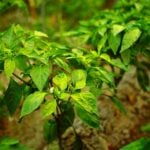Have you tested your soil and are wondering what is the right
Soil testing is a very important step in starting your vegetable garden. There are many reasons why testing your
Soil testing will help you determine the best way to grow your crops, as well as help you avoid any problems before they occur.
A soil testing kit is a convenient way to do your own
Therefore, it is important to know what crop you are testing your
The Right Soil pH For Peppers
Peppers do great when provided with the proper growing conditions.
Peppers do well in soils that have a ph level of 6.0 to 7.0. They like slightly acidic
It’s important to keep in mind that peppers do not like wet
The best

Peppers do not need much fertilizer because they take up nitrogen from the air. A good amount of organic matter also improves the
Pests: The most common pests are aphids, mites, and whiteflies. They can be controlled by using insecticidal soap. To avoid problems with pests, you should plant peppers where there are no large trees or shrubs near the plants.
Diseases: Peppers are prone to some fungal diseases including black spots and anthracnose.
Click Here to Get Info About
Preparing Your Own Soil pH For Peppers
You can test the soil’s pH with a
If your
If you live in an area that experiences long periods of heat and drought, try using peat moss or perlite in your
Pepper plants are heavy feeders and will benefit from frequent applications of a balanced fertilizer.
Kensizer 3-in-1 Soil Tester, Soil Moisture/Light/pH Meter, Gardening Farm Lawn Test Kit Tool

Types Of Peppers
There are two types of peppers: hot peppers and sweet peppers. Hot peppers are the ones that most people think of when they hear the word “pepper.”
Hot Peppers come in many different varieties, including jalapeno, cayenne, habanero, and others. These peppers can range from mild to extremely hot, depending on the variety.
Sweet Peppers include bell pepper, green bell pepper, and orange bell pepper. Sweet peppers are also available in various colors, such as yellow, red, and orange.
Read more about Best Green Beans For Canning
Health Benefits Of Peppers – Soil pH For Peppers
The health benefits of peppers vary by type. The main benefit is that peppers are an excellent source of vitamin C. One cup of cooked bell peppers has about 60% of the recommended daily amount of vitamin C. Other health benefits include:
- Vitamin C – The main antioxidant found in peppers. It helps keep your immune system strong. It also helps keep your blood healthy. Vitamin C is needed to make collagen, a protein that helps build your skin and connective tissues.
- Vitamin A – Vitamin A can help protect against the sun’s harmful rays. It is also a good source of antioxidants.
- Iron – Iron is needed for oxygen transportation in the body. It is also needed for red blood cell production.
- Omega-3 Fatty Acids – Omega-3 fatty acids are heart-healthy. They help keep cholesterol levels low. They also help reduce the risk of heart disease.
- Protein – Peppers contain a lot of protein. This makes them a good source of nutrition for vegetarians.
Final Words On Soil pH For Peppers
The
If the
FAQ’s
Do peppers like acidic or alkaline soil?
Peppers do respond well to acidic soils, and their production is most successful in areas with low pH levels. Soils that are too acidic will not support pepper growth, as the soil pH drops below two. If you have an area of soil that is too acidic, you can add lime (calcium carbonate) to raise the pH level.
How do you make soil acidic for peppers?
You can use compost, manure, or lime to raise the soil pH level, but it’s best to avoid adding fertilizer to your garden if you’re growing peppers. Fertilizers often contain chemicals that can be toxic to plants.
What pH do peppers prefer?
Peppers like soil that is slightly acidic, with a pH level of 6.0 to 7.0.
What is the best fertilizer for peppers?
The right type of fertilizer is a balanced fertilizer that includes nitrogen, phosphorus, and potassium. Potassium is needed by plants to help them absorb water and nutrients from the soil. Potassium also helps regulate the growth of the plant. Each pepper plant needs about 1/2 teaspoon of fertilizer per week.





